In the past weeks, the question of whether recent developments in generative AI will disrupt SEO has become more frequent.
The ongoing advancements in Large Language Models (LLMs), Open AI, ChatGPT, Bing Chat, and Google's Search Generative Experience (SGE) suggest a significant shift in organic search results.
I've been experimenting in Google's generative AI and it's very interesting.
Just to give you one practical example: One of the popular articles on my blog is essentially a how to guide on changing your location in Google Shopping.
When you ask Google (with the SGE enabled), you get this answer:
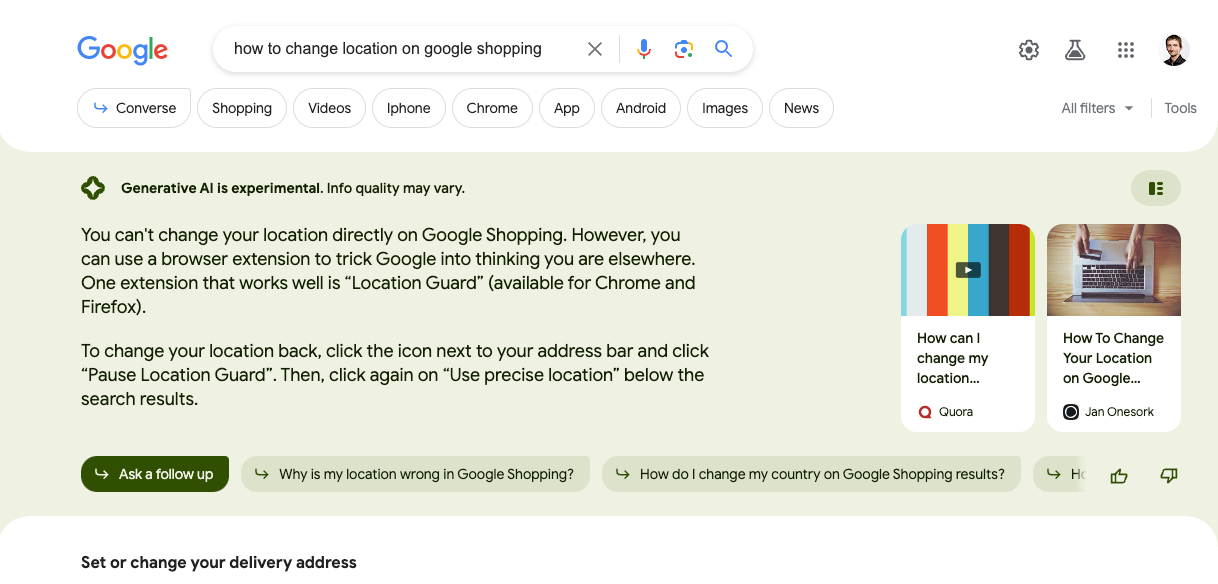
This is such a niche topic, that it is actually easy to see how that's constructued. Google took the content of my Quora post:
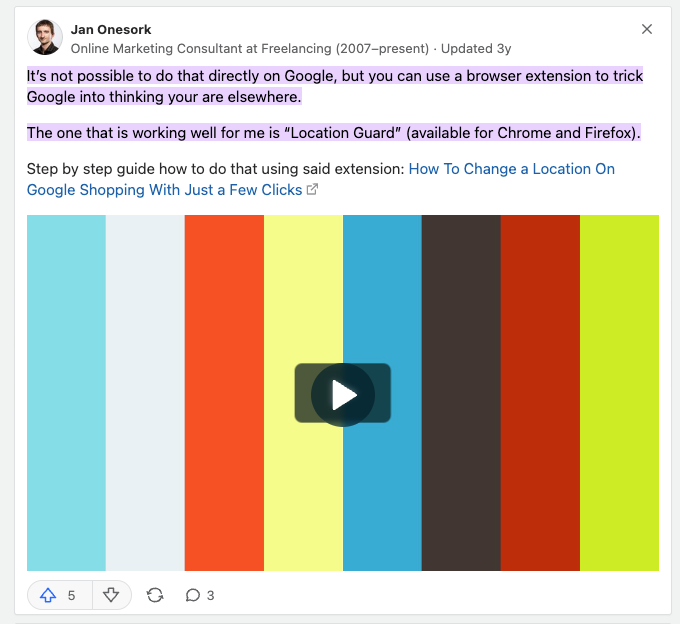
And blended it with my blogpost:
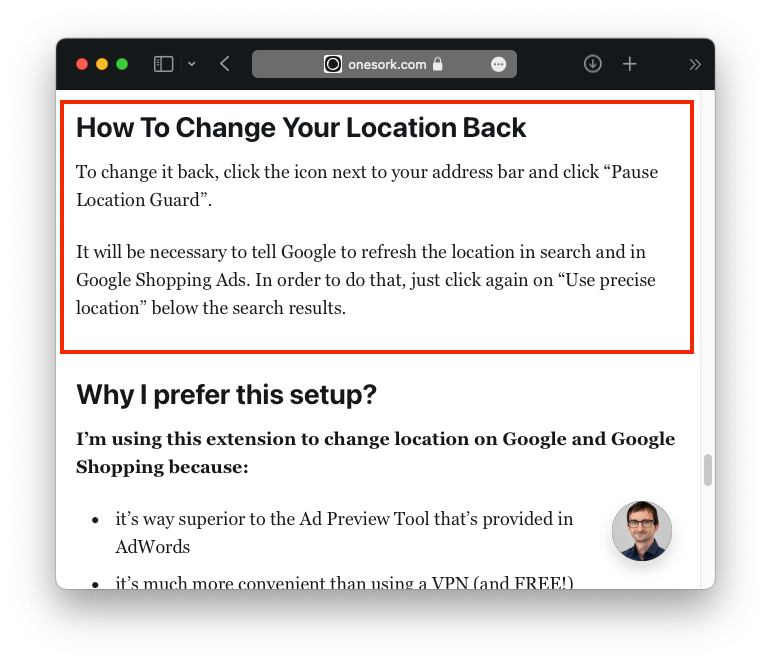
It simply took these two pages, blended and rephrased the content a bit.
If you look very closely, these two sources are actually "attributed":
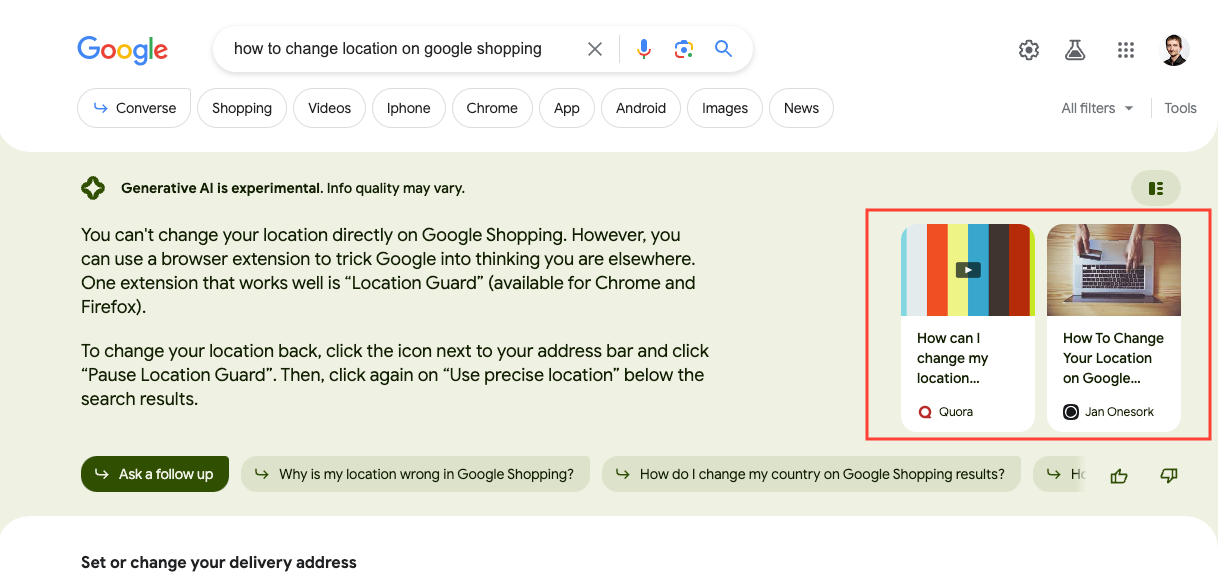
But will anyone click on that? 🤷♂️
Evolution of Zero-Click Search
We know that Google doesn't want to send users to third-party websites (unless you pay them via Google Ads).
That's nothing new - I have this as a core element of the mindset for content and SEO in my content optimization guide since day one.
If you want to look at it from a cynical perspective, you could say that SEO's have been gradually undermining their own necessity for quite some time: While making content easier to crawl, index, and understand we are making it easier for search engines to get to the point when they don't need us at all.

Weather sites could speak about that at length. Also, sites doing unit conversions or calculators, or showing sports scores. These are all features that Google implemented a long time ago.
Even back in 2020, so-called zero-click searches accounted for ~65% of searches:
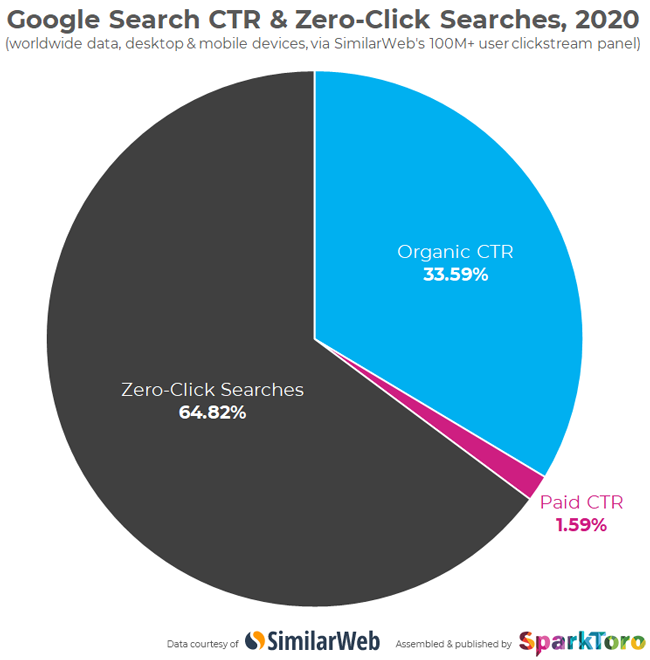
Featured Snippets on Steroids
In 2014, Google first introduced Featured Snippets. There were initial concerns that these snippets could lead publishers to lose traffic. However, it quickly became apparent that this was not the case. In fact, Featured Snippets could be leveraged to increase traffic for some publishers.
Over the years, Featured Snippets have evolved significantly. For example, in my newsletter last August, I reported on Google's implementation of the Multitask Unified Model (MUM) in Featured Snippets, including its newfound ability to understand consensus.
At that point, Featured Snippets were gradually improving, albeit at a very conservative pace.
Then came the introduction of ChatGPT and Bing Chat 🧨
This must have surprised Google, as during this wave of excitement, users didn't seem overly concerned with the accuracy of the results. At least initially, people were content using ChatGPT, which provided somewhat plausible, but not necessarily accurate, responses.
It seems that what mattered more was the direct delivery of answers without any additional friction, as we are, after all, lazy as a sloth.
Google must act to ensure they don't lag behind the competition, but naturally, they need to be much more cautious. Compared to Bing, they have much more at stake.
Their answer is the Search Generative Experience (SGE), which could be thought of as Featured Snippets on steroids.
SGE aims to:
- Provide higher quality answers, reducing the need to visit any other sites,
- Present longer and richer content, further decreasing the necessity to visit other sites,
- Include links or buttons for follow-up questions, minimizing the need to seek additional sources.
What does it mean for SEO?
We're not seeing anything new. However, the long-term trends that been gradually manifesting over the last decade could quickly get to WARP SPEED 🚀
It's hard to predict anything 🔮, but based on the infromation I have available today. I can say:
- The big will become bigger. Google has shown a long-term preference for reliable answers from established sources over slightly more precise answers from smaller sites. If attributions are given, they are likely to favor a few established sites.
- Even more blackboxed. We'll likely have very limited information available for optimization. Do you even remember when we could see EVERY SINGLE KEYWORD?
- Will users find some websites obsolete? Probably yes. If your traffic relies on keywords that Google can easily answer using SGE, there may be little reason for users to visit your site.
- More focus on users and strong brand. Again, nothing new. Creating content with the user and search intent in mind will become even more critical. Keywords not so much.
- Long-tail keywords may see a comeback. The introduction of autocomplete resulted in less variation in user queries, which generally became shorter. With conversational AI, the trend seems to be shifting towards users asking longer, more specific questions, expecting answers specifically tailored to their situations
- Article images will be more important. When you look at how Google currently attributes sources, it shows an article image with a short headline, without any description. Even though this can easily change, article images seem to be even more important here.
SEO is constantly evolving. For instance, technical SEO was critical in the early days when websites were generally in poor shape. Nowadays, it's practically unnecessary for regular websites with a modern CMS. As the focus has shifted towards user intent, I find myself conducting extensive keyword research less frequently.
SEO is more about making sites great for its users - a task that's simple in theory, but can be challenging in practice. So SEO can continue to bring significant value to a project for years to come.
Who's at risk?
If your site provides shallow content that Google can easily replicate in the form of quick answers, then there's cause for concern.
Similarly, if your site attracts a lot of traffic from keywords associated with evergreen content where there's a broad consensus about the correct answer, it would also be a situation to keep an eye on.
The same applies to Featured Snippets. In recent years, established sites have significantly boosted their traffic through the optimization of Featured Snippets, providing content that perfectly fits into the snippet. As SGE is essentially Featured Snippets on steroids, and Google no longer requires that exact form, we can expect significant shifts in traffic in this area. Even if attribution is given and users do click through, these sources are likely to be selected based on different criteria.
Is Google using your content to train their AI?
Yes, they probably are. The Washington Post analyzed Google’s C4 dataset that includes data from ~15 million websites. This model is used to train many of the LLM models (but for models like ChatGPT, we don't know exactly what they use).
Most of my clients' sites are included in the model, contributing to the training of the algorithm.
Usually without any attribution given.
Even my blog is there:

Here you can check if your site is included.
Vincent, we happy?

Is this good news or bad news?
In SEO, you quickly learn to embrace change. The rule of thumb is to never fight the algorithm; instead, we should seek to benefit from it and its ecosystem.
It's going to be exciting to see how SEO and organic search develop in the coming months and years. The potential to experiment with new tactics and focus even more on the user experience is intriguing.
Of course, the novelty will eventually fade, and the situation will stabilize. Concerns about plagiarism will likely arise, especially in the EU with its laws and the European Copyright Directive (this is probably why the current experiment is limited only to the U.S. 😁)
Exciting times lie ahead!




Member discussion